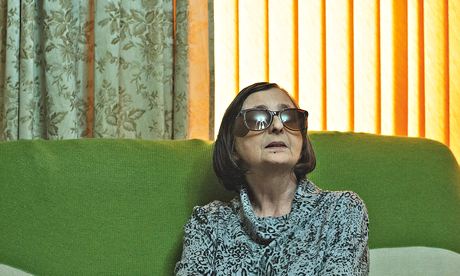
Sunny weather gives most people something to smile about, but I long for dark clouds and short days. I suffer from a rare skin condition that means I experience a severe burning sensation when exposed to UV light.
When it happens, my blood feels as though it's boiling and I can't bear anything touching my skin, including clothes. The pain can last for several days and nights, causing severe sleep deprivation. If it's a bad attack, my hands and face swell up. At times it has lasted for weeks.
I'm not even safe inside, because the windows of buildings and cars intensify the rays, and lightbulbs can emit small amounts of UV light, as can television and computer screens. On overcast days, the sun pokes through the clouds; it also reflects off concrete, water and snow.
My two younger sisters also suffer from the condition, and one of my earliest memories is of the three of us huddled in the porch of our house, desperately trying to keep away from the light. We would do anything to hide from the sun, and always wanted the curtains drawn. Our parents couldn't understand it – there were no physical signs of our pain, just some dirty-looking patches on our skin sometimes.
Eventually, when I was eight, a specialist diagnosed me and my sisters with erythropoietic protoporphyria (EPP), a condition caused by a reaction to the combination of our parents' genes. The diagnosis felt like a mixed blessing: it meant we were allowed to wear jeans, long-sleeved blouses and big straw hats to school, and at break we were allowed to stay under a big oak tree, but it also meant the other children made fun of us, knowing we couldn't chase them.
I longed to fit in, and that feeling stayed with me at college. One really sunny day, when all the students went to the park, I decided to risk it and join them. That night, my face swelled up like never before and the pain was unbearable. I was supposed to meet my boyfriend – now my husband – the next day, but I couldn't face him, so I asked a friend to say I was ill. Not surprisingly, it didn't take long for him to realise that my condition could be debilitating.
Later, we wondered whether we should have children, but we went for it and eventually had four. I remember very tentatively taking each of them outside as babies, worrying they had the condition, too. Thankfully, none of them did.
I was determined that they shouldn't suffer because of my condition. But I did struggle to take them out on clear days, and if we went outdoors or in a very light building, I'd have to announce almost as soon as we got there that we couldn't stay long. School sports days and picnics were a nightmare because I had to sit in the shade, often some distance away, and I paid a high price afterwards. Hot holidays were out of the question and we never went to beaches.
Sometimes the condition can be extremely severe. In really bad years, it takes just a few seconds of exposure to set off a reaction, and I never get any warning signs. Sadly, the bad years seem to come more often now, and weeks or even months can pass without my being able to leave the house.
The emotional impact is the worst. While my marriage is strong, not going out much means it's difficult to make friends. When I do go out, I have to wear a big floppy hat, coat, gloves and large sunglasses, which I can't take off even indoors and which make people think I'm peculiar, so they avoid me and often stare. Even my family don't really understand – my daughter gets angry about how I'm dressed.
At home, my only solution has been UV protective film on all my windows. I used to have it in my car, too, but the law bans that now.
Two positive things have happened recently, though: I've been put on daily vitamin D tablets, which have helped with the aching bones caused by its deficiency; and a special protective cream minimises the pain more than anything has before. I have also met others with the condition, through Facebook. There are at least 1,000 people in the UK with EPP and I'm also in touch with sufferers in America. Though UV rays mean I can't stay on the computer for long, it's been wonderful to share experiences. For the first time, I have friends who truly get it.
• As told to Kate Hilpern
Do you have an experience to share? Email experience@theguardian.com

